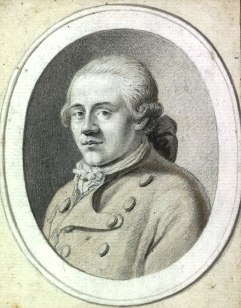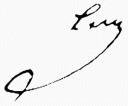Jakob Michael Reinhold Lenz facts for kids
Quick facts for kids
Jakob Michael Reinhold Lenz
|
|
|---|---|
 |
|
| Born | 23 January 1751 Sesswegen, Livonia (now Cesvaine, Latvia) |
| Died | 4 June 1792 (aged 41) Moscow, Russia |
| Occupation | writer, playwright |
| Signature | |
 |
|
Jakob Michael Reinhold Lenz (born January 23, 1751 – died June 4, 1792) was a Baltic German writer. He was an important figure in the Sturm und Drang movement. This was a time in German literature and music when artists expressed strong emotions and individual freedom.
Contents
Early Life and Education (1751-1771)
Jakob Lenz was born in Sesswegen, which is now Cesvaine, Latvia. His father, Christian David Lenz, was a minister. In 1760, when Jakob was nine, his family moved to Tartu, where his father became a minister.
Jakob's first poem was published when he was just 15 years old. From 1768 to 1770, he studied theology. He first studied in Tartu and then in Königsberg.
While in Königsberg, he attended lectures by the famous philosopher Immanuel Kant. Kant encouraged him to read the works of Jean-Jacques Rousseau. Lenz became more interested in writing and less in theology. His first major work, a long poem called Die Landplagen ("Torments of the Land"), came out in 1769. He also studied music during this time.
Becoming a Writer (1771-1776)
In 1771, Lenz left his studies in Königsberg. Against his father's wishes, he took a job with two young barons, Friedrich Georg and Ernst Nikolaus von Kleist. He went with them to Strasbourg.
In Strasbourg, Lenz met other writers and thinkers. He joined a literary group and became friends with the young Johann Wolfgang von Goethe. Goethe became a big inspiration for Lenz. Through Goethe, he also connected with other important figures like Johann Gottfried Herder.
In 1772, Lenz traveled with the von Kleist brothers to different military towns. He also developed feelings for Friederike Brion, but she did not feel the same way.
Lenz returned to Strasbourg in 1773 and continued his studies. The next year, he left his job with the von Kleist brothers. He started working as a freelance writer, giving private lessons to earn money. His friendship with Goethe grew stronger during this time.
Challenges and Later Years (1776-1792)
In April 1776, Lenz followed Goethe to the court in Weimar. At first, he was welcomed. However, in December, he was asked to leave. The exact reasons are not clear, but Goethe vaguely mentioned "Lenz's foolishness." After this, Goethe and Lenz stopped being friends.
Lenz then went to Emmendingen, where he was taken in by Goethe's sister, Cornelia, and her husband. He traveled to different places, including Switzerland. In June 1777, he heard the sad news that Cornelia Schlosser had died. This affected him deeply.
In November, Lenz began to experience serious challenges with his mental health. In January 1778, he was sent to a kind clergyman, Jean-Frédéric Oberlin, in Alsace. Despite Oberlin's care, Lenz's condition worsened.
In June 1779, Lenz's younger brother, Karl, brought him to Riga. Their father was now a General Superintendent there. Lenz tried to find work in Riga, but it was difficult. He also tried to find work in Saint Petersburg, but without much success.
In September 1781, Lenz moved to Moscow. He worked as a private tutor and met with Russian writers and Freemasons. He also translated books about Russian history into German. However, his mental health continued to decline. He became dependent on the help of Russian supporters.
Jakob Lenz was found dead in a Moscow street on June 4, 1792. The exact place where he was buried is not known.
Lenz in Literature and Film
Jakob Lenz's life and struggles have inspired many other artists.
The writer Georg Büchner wrote a famous story called Lenz. This story is about Lenz's visit to the minister Friedrich Oberlin. Oberlin's own notes about Lenz's visit helped Büchner write his story. Later, a composer named Wolfgang Rihm turned Büchner's story into an opera called Jakob Lenz.
Other writers have also created works based on Lenz's life. These include Peter Schneider's story Lenz (1973) and Gert Hoffmann's novella Die Rückkehr des verlorenen J.M.R. Lenz nach Riga (1984). Marc Buhl's 2002 novel, Der rote Domino, uses the friendship between Goethe and Lenz as the basis for a detective story.
Selected Works
Here are some of Jakob Lenz's most well-known works:
- Die Landplagen ("The Torments of the Land"). A long poem, 1769.
- Der Hofmeister, oder Vorteile der Privaterziehung ("The Tutor, or, The Advantages of Private Education"). A play, 1774.
- Der neue Menoza ("The New Menoza"). A play, 1774.
- Anmerkungen übers Theater ("Observations on the Theatre"). An essay about theater, 1774.
- Meinungen eines Laien, den Geistlichen zugeeignet ("Opinions of a Layman, dedicated to the Clergy"). An essay, 1775.
- Pandaemonium Germanicum. A play, written in 1775, published after his death in 1819.
- Die Soldaten ("The Soldiers"). A play, 1776. This play inspired an opera and was a source for another famous play, Woyzeck.
- Die Freunde machen den Philosophen ("Friends Make the Philosopher"). A play, 1776.
- Zerbin. A short story, 1776.
- Der Waldbruder ("The Friar of the Forest"). An unfinished novel, published after his death in 1882.
Filmography
- Günther, Egon (writer/director): Lenz, a film from 1992. It stars Jörg Schüttauf as Jakob Lenz and Christian Kuchenbuch as Goethe.
See also
 In Spanish: Jakob Michael Reinhold Lenz para niños
In Spanish: Jakob Michael Reinhold Lenz para niños
 | Sharif Bey |
 | Hale Woodruff |
 | Richmond Barthé |
 | Purvis Young |

